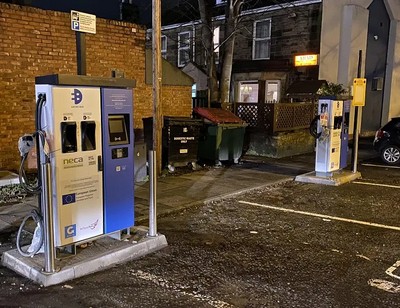Electric vehicle charging points in Newcastle - confusion and delay in repairs and replacements, policy and procurement "shambles" say Newcastle Liberal Democrats

For some time now it has been apparent there have been concerns expressed by Electric Vehicle (EV) users across Newcastle and Gateshead that on-street public charging points are frequently out of action. A great deal of these have ongoing technical problems and have been out of service for long periods, Councillor Greg Ston ehas told Newcastle City Council.
Numerous local points are out of service or currently have reported problems: the situation is viewable at the Zap Map website www.zap-map.com/live
When Liberal Democrats Opposition councillors took this up last September we were advised that the current provision is dated, obsolete, and unable to be maintained due to lack of spare parts and lack of an ongoing maintenance budget. It's unclear why there is a lack of ongoing maintenance funding given that the council suggested that some of the money generated by the 2018 introduction of parking charges for EV parking bays would be used for this purpose - and at least £120,000 has been raised since then. Nevertheless, officers advised that this issue is intended to be addressed by a regional NEPO procurement exercise.
Transport North East has carried out work to develop a regional Zero Emission Vehicle policy, which was agreed by the Joint Transport Committee in March. This identifies a potential requirement for 28,000 public charging points over the next 15 years and aims to increase infrastructure provision. Its foreword by JTC chairman Martin Gannon identifies that "investment in
regional EV infrastructure is so high on the region's . It talks of:
"a co-ordinated approach to the delivery of EV charging infrastructure, ensuring that we have a convenient, accessible, and reliable network"; [and concludes that] "through investing in EV infrastructure we can... deliver more zero emission vehicles on our roads, tackling air pollution, and creating a better environment. That is the prize we strive to achieve for local people"
Fine words that we can all support. But what is the reality behind this rhetoric?
The NEPO regional procurement exercise (NEPO 232 Electric Vehicle Charging Infrastructure was advertised in February 2022. It seeks to "put in place a 15 year concession contract in order to enable long term investment in regional EV charging infrastructure" and notes "investment is needed to upgrade, operate, and maintain the current network and to resource its
expansion in order to secure a sustainable long term future for it".
However, it has emerged in response to enquiries by Liberal Democrats councillors that: "There have been issues with the procurement carried out by NEPO which they are working through. Local Authorities in the region are pressing for a resolution and are looking at short term options too. We understand the growing need for the infrastructure and will update members as soon as there is more information"
After two years of trying, NEPO is still not in a position to agree a contract for procurement of EV public charging infrastructure across the region. It has been suggested to us that NEPO's invitation to tender is so onerous and so poorly structured that not a single supplier has considered it worthwhile to bid.
Councils in the region have suggested that they can do nothing to replace 250 "legacy" EV chargers, of which many are unserviceable, until the NEPO procurement proceeds. Yet councils elsewhere in the country are adopting innovative solutions including on-street charging points on lamp posts.

Liberal Democrats councillors are getting complaints from residents and businesses about failed charging points and the small number of available working charging points. They say that it is increasingly difficult to charge their vehicles away from
their homes or business premises, with considerable competition to access available commercially-provided recharging points.
Given the acknowledged strategic importance of supporting the transition to ultra low emission vehicles to meet 2030 Net Zero aspirations, and increasing the supply of accessible public charging infrastructure, we have significant concern at the apparent failure of the Joint Transport Committee, Transport North East, and NEPO to identify a viable procurement solution.
A lot of public money and time has been expended but we are no further forward. Months of problems are turning into years, and the frustration of EV users at difficulties in finding public charging points that are working and available is clear. This has become a serious policy failure which is a very real obstacle to the region's transition to zero emission vehicles, the achievement of
the council's Net Zero ambitions by 2030, and the imminent implementation of a Clean Air Zone in Newcastle.
On behalf of the Liberal Democrats Opposition, and on behalf of many residents and businesses in Newcastle who are affected by this unhappy situation I call on the Cabinet Member for a Disconnected City, the Cabinet Member for an Inefficient
City, and the chair of the Joint Transport Committee, Cllr Martin Gannon to make an urgent statement on how they propose to address this shambles.
Cllr Robin Ashby added :
Already there are over half a million private electric cars on Britain's roads, with a quarter of a million more expected to be registered this year.
Are we at a tipping point? Perhaps. Hydrogen could still be the fuel of the future.
But infrastructure and investment are essential if the momentum for change is to be sustained.
Already new-build commercial premises, like a drive through in Parklands Ward, are making private provision.
But more can and must be done locally, led by Newcastle City Council
I draw attention to the many streets of London in residential area where electric vehicles can already be plugged into lamp posts.
But there must be a word of warning.
Many people are uncomfortable about our dependence on Middle East oil and the dubious human rights and democratic credentials of some of the states there.
Calls for boycotts are overwhelmed by the need to keep the wheels turning.
The more dependent we become on electric vehicles, the more the balance of power will shift not just to US led multi national manufacturers but also to countries and their controllers who are the source of rare earth materials needed to make the batteries, like cobalt and lithium.
The bulk of the cobalt supply comes from the politically unstable Democratic Republic of Congo - a byword in my youth for massacre.
Cobalt is produced at nickel and copper mines, and is therefore dependent on their economics. Environmental standards and treatment of workers (including child labour) are already a cause for concern. The DRC supplies about 70 percent of the world's cobalt, but 80% of its major industrial cobalt mines are owned or financed by Chinese companies The Communist Pary there - identified by our Government as a strategic competitor - have an important weapon in their hands. Tesla is trying to lock in supply agreements with non-China associated operations.
Lithium is more widely available - even in mine water under County Durham. Investment could give us greater self sufficiency. But strategic thinking to create conditions to encourage such investment, beyond the next U turn, is currently in short supply from our current Government.
And of course there could be a disposal problem for toxic materials in the future. Already a million used e-cigarettes go to landfill every day because recycling is difficult or expensive or not required.
We must be aware that there are no simple answers to mankind's problems, and possible bad consequences whatever is done.
